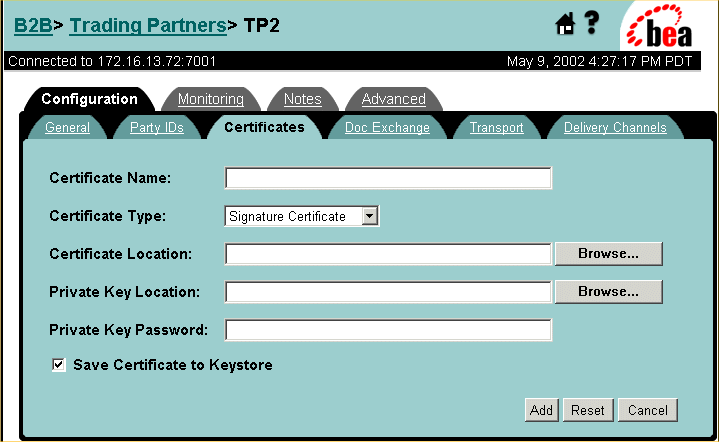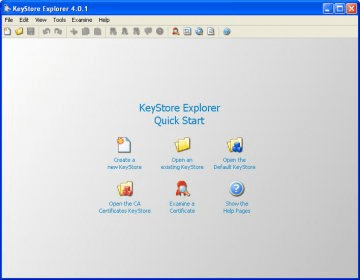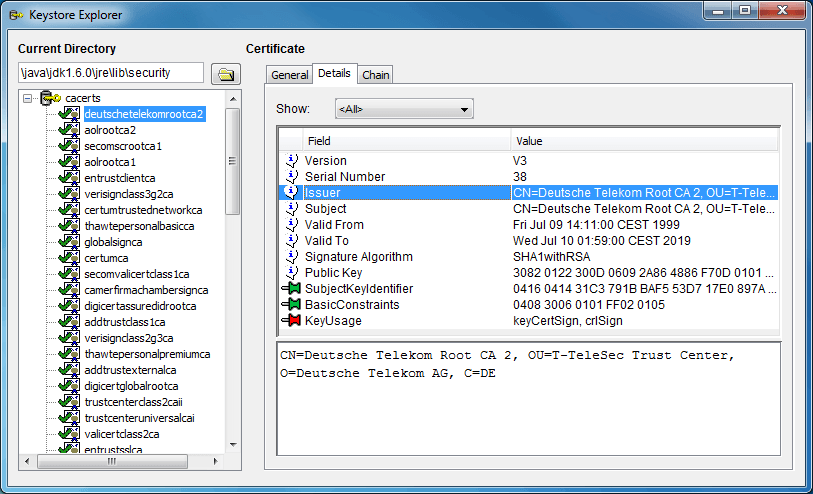
What is important is that there are two different certificates in the WebLogic keystore both with different aliases that are known to you. Keytool -changealias -keystore server.jks -alias server -destalias aveksa-server In the example below, server.jks is the name of your existing keystore. If you have your own certificate that is currently in use in a WebLogic keystore and the server alias is server, run this command to rename the alias prior to importing server.keystore into your WebLogic keystore as instructed in RSA Identity Governance & Lifecycle Installation Guide. If you import server.keystore into your WebLogic keystore, it is possible that there will be a conflict with the certificate alias server that is commonly used Warning: The server.keystore uses the server alias server. p12) openssl pkcs12 -export -out certificate.pfx -inkey privateKey.key -in certificate.Environment > Servers > Instance Name > Protocols > Aveksa8444 > Security tab > Custom Channel Private Key Alias. Convert a PEM certificate file and a private key to PKCS#12 (.pfx.You can add -nocerts to only output the private key or add -nokeys to only output the certificates. p12 ) containing a private key and certificates to PEM openssl pkcs12 -in keyStore.pfx -out keystore.pem -nodes Convert a PEM file to DER openssl x509 -outform der -in certificate.pem -out r.der) to PEM openssl x509 -inform der -in certificate.cer -out certificate.pem Export dialog is displayed, select OpenSSL and. Remove a passphrase from a private key openssl rsa -in privateKey.pem -out newprivatekey.pem Export private key in PEM format Right-click on the Trusted Certificate entry in the KeyStore Entries table.Generate a certificate signing request based on an existing certificate openssl x509 -x509toreq -in certificate.crt -out CSR.csr -signkey privatekey.key.Generate a certificate signing request (CSR) for an existing private key openssl req -out CSR.csr -key privatekey.key -new.Generate a self-signed certificate openssl req -x509 -sha256 -nodes -days 365 -newkey rsa:2048 -keyout privatekey.key -out certificate.crt.

Generate a new private key and Certificate Signing Request openssl req -out CSR.csr -new -newkey rsa:2048 -nodes -keyout privatekey.key.Keytool -import -trustcacerts -file /path/to/ca/ca.pem -alias CA_ALIAS -keystore $JAVA_HOME/jre/lib/security/cacerts Keytool -list -v -keystore $JAVA_HOME/jre/lib/security/cacerts Keytool -export -alias mydomain -file mydomain.crt -keystore keystore.jks Keytool -storepasswd -new new_storepass -keystore keystore.jks Delete a certificate from a Java Keytool keystore.Keytool -list -v -keystore keystore.jks -alias mydomain Check a particular keystore entry using an alias.Check which certificates are in a Java keystore.Keytool -genkey -keyalg RSA -alias selfsigned -keystore keystore.jks -storepass password -validity 360 -keysize 2048 Generate a keystore and self-signed certificate.

Keytool -import -trustcacerts -alias mydomain -file mydomain.crt -keystore keystore.jks

Keytool -genkey -alias mydomain -keyalg RSA -keystore keystore.jks -keysize 2048 Any root or intermediate certificates will need to be imported before importing the primary certificate for your domain.

These commands allow you to generate a new Java Keytool keystore file, create a CSR, and import certificates.
FIND PRIVATE KEY ALIAS KEYSTORE EXPLORER SOFTWARE
Thanks for using this software, for Cofee/Beer/Amazon bill and further development of this project please Share.Īny private key value that you enter or we generate is not stored on this site, this tool is provided via an HTTPS URL to ensure that private keys cannot be stolen, for extra security run this software on your network, no cloud dependencyĪsking for donation sound bad to me, so i'm raising fund from by offering all my Nine book for just $9


 0 kommentar(er)
0 kommentar(er)
